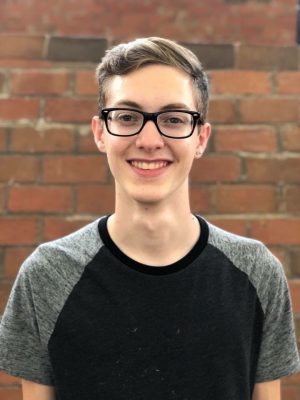
Since its inception in 1989, the National Defense Science and Engineering Graduate (NDSEG) Fellowship has been awarded to only 4400 students. In that time, over 65,000 have applied. The highly competitive fellowship, sponsored by the Air Force Office of Scientific Research (AFOSR), the Army Research Office (ARO), and the Office of Naval Research (ONR), was established by the U.S. Congress to increase the number of U.S. citizens receiving doctoral degrees in science and engineering disciplines of military importance.
Materials Science and Engineering Ph.D. candidate Mason Freund has been named a recipient of this prestigious fellowship. IMS News spoke with Mason about his early interests in science and the catalysts and decisions leading to his being named a NDSEG Fellow.
You earned your Bachelor of Science degree in mechanical engineering with a concentration in aerospace engineering. In your pursuit of your Ph.D. your focus remains on aerospace science. When did you begin to be interested in aerospace science and what about aerospace science keeps you engaged?
I think there’s always been some interest in aerospace science starting from playing with toys and enjoying sci fi movies as a kid. This steered me towards spaceships and planes and slowly evolved into interest in the sciences and engineering. Finally, being able to learn about aerospace engineering during my undergrad seemed to bring everything together. And now being a fellow under the Air Force Office of Scientific Research (AFOSR) I will be able to interact with the field on a deeper level. I am constantly learning new information and techniques that keeps the learning experience engaging but there are also always new discoveries and ideas that keep pushing the known boundaries to something that is better, faster, or stronger. I think those new discoveries and possibilities will keep me engaged for a long time.
How/when did you begin to tie materials science into your interest in aerospace science?
The mechanical engineering curriculum requires an introduction to materials science. I didn’t know what the field of materials science was or could lead to, but I quickly became interested in learning more about the field. I decided to go for a minor and take courses that could add another dimension to my curriculum and benefit my aerospace science interests.
Congratulations on being named a 2022 DoD NDSEG Fellow. How did you come to apply for the NDSEG Fellowship and what was your reaction after learning you had been selected for the fellowship?
My advisor (Volkan Ortalan) made me aware of some different fellowships early on in my graduate studies. After doing more research over the course of last fall, I applied to a few different fellowships. Then came a long 4-6 month wait to April when the results were expected to come out. I checked my email one night at the end of March and was surprised to see an email from NDSEG. I was then even more surprised and excited to realize it was an acceptance letter. It was the first one I got back, and I wasn’t even expecting a letter for at least another few days. I was very excited and slightly caught off guard, but it made my night and my week.
Tell us about your research and its short- and long-term implications for real-world applications.
My group is primarily a microscopy group. We spend most time on transmission electron microscopes (TEM) in addition to other instruments and techniques. Our lab has a special ultrafast TEM which allows us to investigate reactions and dynamics at very short time scales. Specifically, my research will take advantage of these capabilities to investigate reaction dynamics of nano energetic materials to better understand behaviors from these materials as well as nanoparticle enhancement at the necessary timescales.
This work is useful for further insights into nano energetics and optimization for use in propellants and other related technologies as well as directly relating to programs within the AFOSR. The field of nano energetics plays a role in many propulsion applications as well as high power linear actuators. There are also possibilities for use in miniature applications such as micro or nano satellites. This research will provide a more fundamental understanding of the behaviors and can lead to better control, optimization, and performance of the technology.
After earning your bachelor’s degree, you chose to continue your graduate studies at UConn. What was the catalyst for your decision?
As I mentioned, I started my minor and was taking MSE courses throughout my time in undergraduate studies. In one of the MSE courses the professor was Dr. Ortalan who is now my advisor. He asked me what I was planning on doing after graduation. I knew that I might want to go back to graduate school eventually, but I was also initially looking for jobs in industry. He mentioned about his open position for a graduate student and about the work that would be required but also the benefits and investment that it would be for my future. This really was the catalyst for my decision. I would have taken it either way but graduating in 2020 at the beginning of the pandemic and hearing about difficulties in job hiring made the decision even easier.